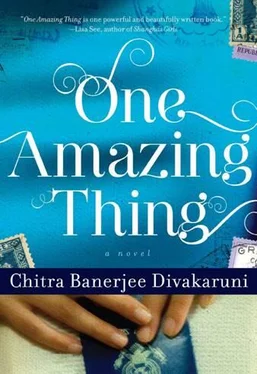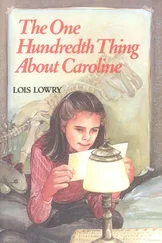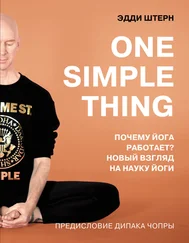“Tell us why you picked this story,” Uma said.
“It was the only time in my life I did something brave,” Malathi said, “even though it was a big cost for me. I don’t think I can do that again. I am too selfish. So it is special to me.”
At the mention of selfishness, Mangalam’s head jerked up as though he had not expected her to confess to such a vice.
“Does anyone need a bathroom break?” Cameron asked. People looked down at the water, weighing their need against its darkness. Mr. Pritchett waited, trying not to fidget. He didn’t want to go if there were other trekkers to the bathroom. There was only one flashlight allowed for such errands, and they would have to wait around to walk back together. They might smell the smoke.
“Well, then,” Cameron said, “let’s start a story.”
“I want Tariq to be next,” Lily said. Tariq looked startled and not particularly pleased. Uma was sure he would say no. But he nodded at Lily and cleared his throat.
“Excuse me,” Mr. Pritchett said, jumping down before Tariq could begin. “Back in a moment.” He took the pencil light-very dim by now-that Cameron handed him. He was glad he hadn’t had to tell a lie about the purpose of his trip. He did not like lying. He sensed Mrs. Pritchett’s eyes on his back as he made his way through the icy water. Did she guess? When he thought he was out of the range of Cameron’s big flashlight, he put his hand into his pants pocket and caressed his lighter. He had almost reached the door to Mangalam’s office when he heard a splash. He turned and saw that Mangalam, too, had climbed down. “Wait for me,” he called as he hurried toward Mr. Pritchett.
Mr. Pritchett felt a futile fury surge through him. He rubbed his thumb against the serrated wheel of the lighter as though it were a magic lamp and tried to come up with another plan. Failing, he offered the pencil light to Mangalam. “You go first.”
But Mangalam, who had plans of his own, gestured solicitously and said, “No, no. After you, please.”
Mr. Pritchett walked into the bathroom and pushed the door through the water until it closed. He had to use all his self-control to keep from slamming a fist into the wall. He grabbed the edge of the sink in both his hands and held it tightly, trying to decide what to do. Could he take the chance that Mangalam wouldn’t smell his cigarette when he walked in here? No. No amount of deodorizing spray could disguise the odor of burned tobacco that quickly. Would Mangalam report him to Cameron? Very possibly. The visa officer seemed to hold the sergeant in some awe. What could the sergeant do to him, though? What could any of them do?
Nothing, Mr. Pritchett said to his sallow reflection. At most, they would confiscate his cigarettes, but he had already hidden a few. If they took the lighter, he could sneak a book of matches. He took out a cigarette and placed it between his lips, his hands trembling from anticipation. He could already taste the smoke.
A knocking on the door made him jump. Voices. Mangalam-and someone else. Their words were unclear but insistent. One of them jiggled the handle.
Mr. Pritchett cursed under his breath and stuffed the cigarette back into its packet, hoping he hadn’t injured it. He splashed his face with water, gasping at its coldness, and pulled the door through the water.
Cameron was standing there, his hand on the doorknob. “Are you okay? Mangalam said he called you a couple of times, but you didn’t answer.”
“I’m fine,” Mr. Pritchett said. He knew he sounded snappish, but he couldn’t help it. How much time had he spent in there? Cameron stared at Mr. Pritchett’s dripping face. Mr. Pritchett pushed past the two men into the dark. Behind him, he could hear Cameron telling Mangalam, “We’ll have to insist that people not lock the door when they go to the bathroom.” Hah, thought Mr. Pritchett. Insist away, Sarge. I’ll do what I need to. The smell of bourbon seemed to be all around him. Was nicotine withdrawal messing with his senses? In his hurry he banged his hip into something hard and metallic. Pain shot through him. He stumbled and felt one of the men grab his arm.
“Careful, buddy!” Cameron said. “The world has handed us enough problems already.”
Hadn’t he said almost the same thing to his wife a while ago? Mortified, Mr. Pritchett trudged to his table. But he wasn’t too mortified to decide that while everyone was eating, he would try his luck again.
When Ammi called on my cell phone, I was sitting out on the quad with Ali and Jehangir, watching the girls walk by in skimpy outfits. It was the first warm day in weeks, with the sun out, and the girls were making the most of it. We were, too. Truth to tell, I didn’t enjoy girl-watching as much since Farah and I had become close. But I didn’t say this. Already my buddies teased me about her, though it was gentle compared to the things they would have said if I had been going with a girl who was non-Muslim and non-desi.
Farah? She’s my mother’s best friend’s daughter from India. She spent a semester with us last year. More about her later.
Out on the quad, we were ranking the girls one to ten, with ten for the hottest. For us, “hottest” meant the ones that we thought would end up in the hottest circle of Islamic hell. The things we considered were: how much of their bodies they exposed, how much makeup they wore, how loudly they laughed, and how much public display of affection they allowed. I felt guilty about this, too. If Farah knew what we were doing, she would have been mad. Though she was serious about her religion, she believed in live and let live, and she didn’t appreciate crude comments about women. I consoled myself with the thought that the white guys I used to party with earlier would have said cruder things.
I’m not sure when I stopped paying attention to the girls and began daydreaming about Farah. We had kept in touch through e-mail since she left last year. She was a good writer, not like me. Her notes brought the smallest aspects of her daily life alive: the posters of Indian art that she had put up on the walls of the bedroom she shared with her sister; the roadside stall in Nizamuddin East that sold the best kebabs in Delhi; the intercollegiate debate where she presented arguments against the Narmada Dam Project and won a trophy; a visit to her grandmother who lived in their ancestral village where you had to hand-pump water. I had to admit that the India of her letters sounded pretty interesting.
Farah’s sister was getting married in a couple of months, and her mother had invited us to come and stay with them for the week of festivities-and for as long afterward as we could spare. Ammi was dying to go. She hadn’t been part of a traditional wedding in years. I agreed to accompany her, though I didn’t let on how excited I was at the thought of being with Farah again (and seeing her wear the zardosi lengha she had already bought for the wedding). Ammi had a tendency to jump to conclusions and then share those conclusions with the world.
Ammi had been trying to persuade Abbajan to go with us, too. His assistant manager, Hanif, she pointed out, was very trustworthy, and anyway, business was really slow. She was right. Jalal’s Janitorial Services, which my father had built from scratch into a flourishing enterprise, had lost many of its biggest customers since 9/11. Though no one came out and said it, people weren’t comfortable having Islamic cleaners going into their offices when they weren’t around. It didn’t matter that the same men had been cleaning those offices for over a decade. Abba was too proud-or maybe too hurt-to try to persuade his clients to change their minds.
Out on the quad, when the phone rang and I saw that it was Ammi, I didn’t take the call. It was almost time for my Calculus class. The professor took off points for lateness, and I couldn’t afford to lose any points. Ammi called me almost every day, usually to ask me to pick something up from the grocery, and if she got me on the line, she would talk for a long time. She had become used to Farah’s company and was lonely now with no one at home. I figured she could leave me a message with her shopping list.
Читать дальше












